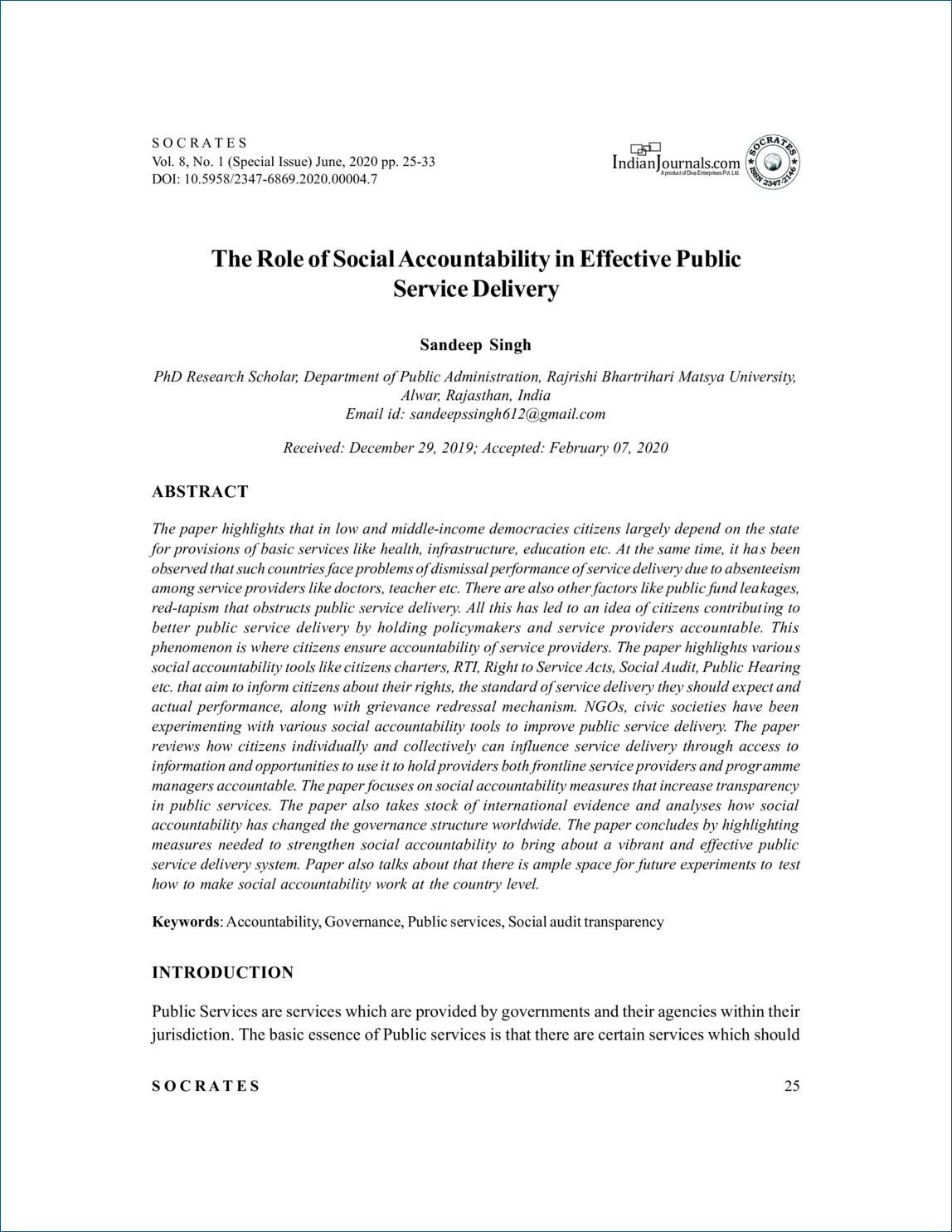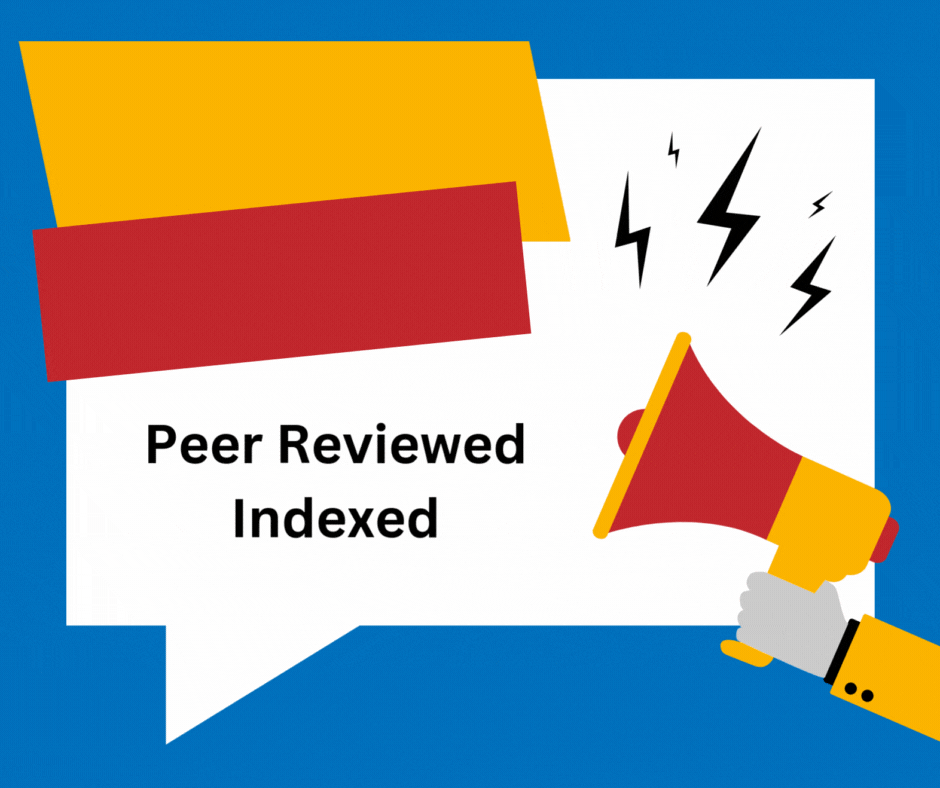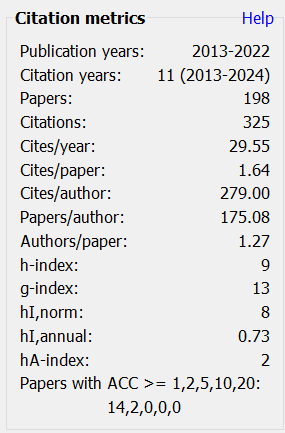The Role of Social Accountability in Effective Public Service Delivery
DOI:
https://doi.org/10.5958/2347-6869.2020.00004.7Keywords:
Accountability, Social Audit, Transparency, Public Services, GovernanceAbstract
The paper highlights that in low and middle-income democracies citizens largely depend on the state for provisions of basic services like health, infrastructure, education etc. At the same time, it has been observed that such countries face problems of dismissal performance of service delivery due to absenteeism among service providers like doctors, teacher etc. There are also other factors like public fund leakages, red-tapism that obstructs public service delivery. All this has led to an idea of citizens contributing to better public service delivery by holding policymakers and service providers accountable. This phenomenon is where citizens ensure accountability of service providers. The paper highlights various social accountability tools like citizens charters, RTI, Right to Service Acts, Social Audit, Public Hearing etc. that aim to inform citizens about their rights, the standard of service delivery they should expect and actual performance, along with grievance redressal mechanism. NGOs, civic societies have been experimenting with various social accountability tools to improve public service delivery.
The paper reviews how citizens individually and collectively can influence service delivery through access to information and opportunities to use it to hold providers both frontline service providers and programme managers accountable. The paper focuses on social accountability measures that increase transparency in public services. The paper also takes stock of international evidence and analyses how social accountability has changed the governance structure worldwide.
The paper concludes by highlighting measures needed to strengthen social accountability to bring about a vibrant and effective public service delivery system. Paper also talks about that there is ample space for future experiments to test how to make social accountability work at the country level.
DOI: 10.5958/2347-6869.2020.00004.7
Downloads
Metrics
References
Arora, R. K., & Goyal, R. (2013). Indian public administration: institutions and issues (3rd ed.). New Delhi: New Age International.
ASER Centre.(2019). Annual Status of Education Report, 2018. Delhi, Delhi.
IIPA. (2008). Public Grievance Redress and Monitoring System in Government of India Ministries and Departments. Delhi, Delhi.
Jayal, N. G. (2007). New Directions in Theorising Social Accountability? IDS Bulletin, 38(6), 105–112. doi: 10.1111/j.1759-5436.2007.tb00425.x
Joshi, A. (2007). Producing Social Accountability? The Impact of Service Delivery Reforms. IDS Bulletin, 38(6), 10–17. doi: 10.1111/j.1759-5436.2007.tb00414.x
Laxmikanth, M. (2012). Public administration: for state civil services and other competitive examinations. New Delhi: Tata McGraw Hill Education Private Ltd.
Ringold, D., Holia, A., Koziol, M., & Srinivasan, S. (2011). Citizens and Service Delivery: Assessing the Use of Social Accountability Approaches in the Human Development Sectors (Directions in Development). The World Bank Group.
Sevottam Model. (2017, December 2). Retrieved May 3, 2020, from http://www.clearias.com/sevottam-model/

Downloads
Published
How to Cite
Issue
Section
Categories
License
Copyright (c) 2020 Mr Sandeep Singh

This work is licensed under a Creative Commons Attribution-NonCommercial 4.0 International License.
Revised Copyright/CC license that applies to all the articles published after 05-02-2017
Attribution-NonCommercial 4.0 International (CC BY-NC 4.0)

Copyright/CC license that applies to all the articles published before 05-02-2017
Attribution-Non Commercial-No Derivatives 4.0 International (CC BY-NC-ND 4.0)

Author(s) will retain all the right except commercial and re-publishing rights. In the case of re-publishing, they will have to obtain written permission from the journal. Additional licensing agreements (Creative Commons licenses) grants rights to readers to copy, distribute, display and perform the work as long as you give the original author(s) credit, they can not use the works for commercial purposes and are not allowed to alter, transform, or build upon the work. For any reuse or distribution, readers and users must make clear to others the license terms of this work. Any of these conditions can be waived if you get permission from the copyright holders. Nothing in this license impairs or restricts the authors’ rights. To view a copy of this license, visit http://creativecommons.org/licenses/by-nc-nd/4.0/ or send a letter to Creative Commons, 171 Second Street, Suite 300, San Francisco, California, 94105, USA.
Research Papers published in SOCRATES are licensed under an Attribution-NonCommercial-NoDerivatives 4.0 International (CC BY-NC-ND 4.0)
















